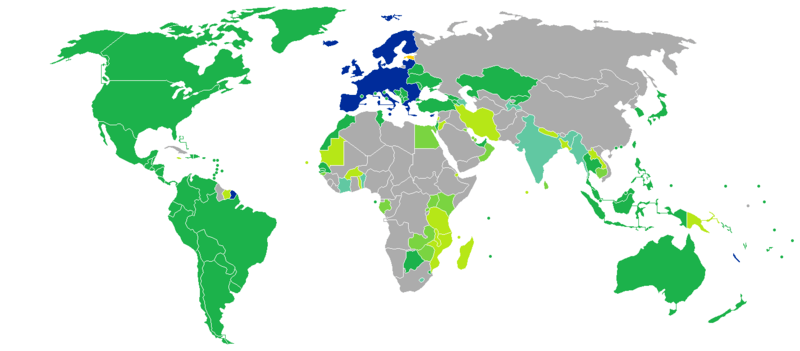Estonian nationality law
 |
|---|
| This article is part of a series on the politics and government of Estonia |
|
Estonian citizenship – based primarily on the principle of jus sanguinis – is governed by a law promulgated on the 19th of January 1995 by the Riigikogu which took effect on the 1st of April 1995. The Police and Border Guard Board[1] (Estonian: Politsei- ja Piirivalveamet) is responsible for processing applications and enquiries concerning Estonian citizenship.
Resolution Concerning the Citizenship of the Democratic Republic of Estonia, the first Estonian citizenship law was adopted by the Estonian National Council on 26 November 1918. According to this law, all people who
- 1) were permanent residents on the day the law came into force on the territory of the Republic of Estonia;
- 2) prior to the Estonian Declaration of Independence on 24 February 1918 had been subjects of the Russian State;
- 3) were entered in the parish registers or originated from the territory of Estonia,
regardless of their ethnicity and faith were proclaimed Estonian citizens.
The Citizenship Law adopted in 1922 defined the principles of succession by applying the jus sanguinis principle.[2]
Eligibility for Estonian citizenship
By descent
Children born to parents, at least one of whom was an Estonian citizen at the time of birth (regardless of the place of birth) are automatically considered Estonian citizens by descent.
By place of birth
Children born in Estonia are eligible for Estonian citizenship if at least one parent holds Estonian citizenship at the time of birth.
By marriage
A person who married an Estonian citizen before 26 February 1992 is eligible for Estonian citizenship.
By naturalisation
Those seeking to become Estonian citizens via naturalisation are required to fulfill the following criteria:
- applicant is aged 15 or over
- resided in Estonia legally for at least eight years and, of that, have spent the last five years with permanent residence in Estonia
- be familiar in the Estonian language. People who have graduated from an Estonian-speaking high school or an institute of higher education are assumed to fulfill this criterion without the need to take a full examination.
- take an examination demonstrating familiarity with the Estonian Constitution
- showing a demonstrated means of support
- taking an oath of loyalty
Those who have committed serious crimes or are foreign military personnel on active duty are ineligible to seek naturalisation as an Estonian citizen.
Duties and rights of Estonian citizenship
- Male Estonian citizens are required to take up national service.[3]
Undefined citizenship
'Undefined citizenship' (Estonian: kodakondsuseta isik, Russian: негражданин) is a term used in Estonia to denote a post-Soviet form of statelessness. It is applied to those migrants from former Soviet republics and their children, who were unable or unwilling to pursue any country's citizenship after the collapse of the Soviet Union. Russia being a successor state to the Soviet Union, all former USSR citizens qualified for citizenship of Russian Federation, available upon mere request, as provided by the law "On the RSFSR Citizenship" in force up to end of 2000.[4] Estonia's policy of requiring naturalisation of post-war immigrants was in part influenced by Russia's citizenship law and the desire to prevent dual citizenship,[5] and upon the established legal principle that persons who settle under the rule of an occupying power gain no automatic right to nationality. According to Peter Van Elsuwege, a scholar in European law at Ghent University, a number of historic precedents support this, most notably the case of Alsace-Lorraine when France on recovering the territory in 1918 did not automatically grant French citizenship to German settlers despite Germany having annexed the territory 47 years earlier in 1871.[6]
Persons of undefined citizenship who reside legally in Estonia can apply for an alien's passport. Estonian alien's passport allows visa-free travel within Schengen treaty countries for a maximum of 90 days in a 6-month period.[7] Alternatively they are entitled to naturalise as citizens and receive an Estonian passport, and more than half have opted to do so since 1992.[8]
The European Commission against Racism and Intolerance, Advisory Committee on the Framework Convention for the Protection of National Minorities and UN Special Rapporteur on racism Doudou Diene recommend to Estonia simplifying naturalization generally or for the elderly and economically marginalized, as well as encouraging registration of children born in Estonia after 1991 as its citizens.[9][10][11]
Dual citizenship
Although not legally permitted, some naturalised Estonian citizens also possess another, e.g., Russian citizenship. According to law, acquiring a foreign citizenship voluntarily and entering into a military or civilian service for another state constitute forfeiture of Estonian citizenship. In effect, this forfeiture requirement applies to naturalised Estonian citizens only, because, according to the constitution, Estonian citizenship obtained by descent is inalienable and cannot be taken away by anyone else other than the citizenship holder.[12]
Citizenship of the European Union
Because Estonia forms part of the European Union, Estonian citizens are also citizens of the European Union under European Union law and thus enjoy rights of free movement and have the right to vote in elections for the European Parliament.[13] When in a non-EU country where there is no Estonian embassy, Estonian citizens have the right to get consular protection from the embassy of any other EU country present in that country.[14][15] Estonian citizens can live and work in any country within the EU as a result of the right of free movement and residence granted in Article 21 of the EU Treaty.[16]
Travel freedom of Estonian citizens
Visa requirements for Estonian citizens are administrative entry restrictions by the authorities of other states placed on citizens of Estonia. In 2017, Estonian citizens had visa-free or visa-on-arrival access to 164 countries and territories, ranking the Estonian passport 13th in the world (tied with Malaysia) according to the Henley & Partners Visa Restrictions Index 2017. [17]
In 2017, the Estonian nationality is ranked twenty-first in the Nationality Index (QNI). This index differs from the Visa Restrictions Index, which focuses on external factors including travel freedom. The QNI considers, in addition, to travel freedom on internal factors such as peace & stability, economic strength, and human development as well. [18]
See also
- Nationality law
- Estonian passport
- Non-citizens (Latvia)
- Non-citizen US Nationals – American Samoans, who are US nationals but not US citizens.
References
- ↑ Police and Border Guard Board http://www.politsei.ee/en/
- ↑ "Birth of a State: Formation of Estonian Citizenship (1918–1922)" (PDF). the Directorate General for Research of the European Commission, CLIOHRES.net. Retrieved 28 July 2009.
- ↑ "Kodanik ja riigikaitse" (in Estonian). kra.ee.
- ↑ The Policy of Immigration and Naturalization in Russia: Present State and Prospects Archived 27 February 2008 at the Wayback Machine., by Sergei Gradirovsky et al.
- ↑ Wayne C. Thompson, Citizenship and borders: Legacies of Soviet empire in Estonia, Journal of Baltic Studies, Volume 29, Issue 2 Summer 1998 , pages 109 – 134
- ↑ Peter Van Elsuwege, From Soviet republics to EU member states: a legal and political assessment of the Baltic states' accession to the EU, BRILL, 2008, p75
- ↑ Tänasest saab välismaalase passiga Schengeni ruumis viisavabalt reisida
- ↑ Jarve, Priit (2009). Rainer Bauböck; Bernhard Perchinig; Wiebke Sievers, eds. Estonian citizen: Between ethnic preference and democratic obligations. Citizenship Policies in the New Europe. Amsterdam University Press. p. 60. ISBN 9789089641083.
- ↑ European Commission against Racism and Intolerance Third report on Estonia (2005) — see Paragraph 129, 132
- ↑ Second Opinion on Estonia, Advisory Committee on the Framework Convention for the Protection of National Minorities, 2005 — see Para. 189
- ↑ UN Special Rapporteur on contemporary forms of racism, racial discrimination, xenophobia and related intolerance Report on mission to Estonia (2008) — see Paragraph 91
- ↑ The Constitution of the Republic of Estonia
- ↑ "Estonia". European Union. Retrieved 4 May 2015.
- ↑ Article 20(2)(c) of the Treaty on the Functioning of the European Union.
- ↑ Rights abroad: Right to consular protection: a right to protection by the diplomatic or consular authorities of other Member States when in a non-EU Member State, if there are no diplomatic or consular authorities from the citizen's own state (Article 23): this is due to the fact that not all member states maintain embassies in every country in the world (14 countries have only one embassy from an EU state). Antigua and Barbuda (UK), Barbados (UK), Belize (UK), Central African Republic (France), Comoros (France), Gambia (UK), Guyana (UK), Liberia (Germany), Saint Vincent and the Grenadines (UK), San Marino (Italy), São Tomé and Príncipe (Portugal), Solomon Islands (UK), Timor-Leste (Portugal), Vanuatu (France)
- ↑ "Treaty on the Function of the European Union (consolidated version)" (PDF). Eur-lex.europa.eu. Retrieved 2015-07-10.
- ↑ "Global Ranking – Visa Restriction Index 2017" (PDF).
- ↑ "The 41 nationalities with the best quality of life". www.businessinsider.de. 2016-02-06. Retrieved 2018-09-10.
